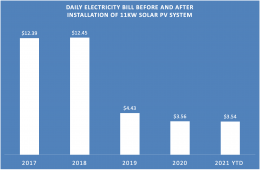Charlie Woods
New Member
- Joined
- Jul 22, 2021
- Messages
- 28
Were it financially feasible, it would be out there. It can be done, no doubt. But it’s not being done,
Exactly. The O.P. has not responded on this thread. I suspect he did some math and discovered how infeasible solar A/C is in Houston.
Like mesquito_creek said above...
1. Find the best electricity rate for zip code 77494 on http://powertochoose.orgSo lets look at the OPs consumption " In July I pulled 1951kw in total (63kw a day)."
63000 watts in one day, divide that by 24 hours and on avg he uses 2625 watts an hour. You are only going to make good solar power for about 5-6 hours best case. Lets say from 10 am to 4 pm. That is being very generous. But lets focus on the time that you don't make solar, from 5 pm to 9 am, that is 16 hours.
16 hours at 2625 = 42000 watt hours of battery. So now during the 6 hours you make PV power you need to cover your load 15,750 + recharge 42000 watts or a total 57,750. Your array would need to make about 10000 watts an hour over that 6 hours. Probably need a 15K watt array to cover it. You gave yourself Zero room for error or other loads and you have designed it for 1 day with no reserve. You get anything less than your 6 full hour of PV and you are short.
2. Work up a dollar cost to install the solar system above.
3. See if the Return on Investment exceeds the expected service life of the system.
If it did, people would be doing it.



